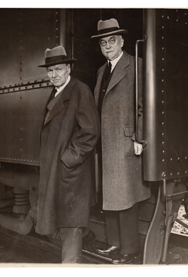Interpreting the Idea of Liberty
The scope of individual liberty, which found basic expression in Magna Carta, has been at the heart of much American legal debate. At the landmark trial of printer Peter Zenger (1738), truth was accepted as a valid defense against charges of libel, helping to influence nascent colonial opinion regarding freedom of the press. A Treatise on the Law of Libel (1830) argued against restrictive English doctrine, and for a free press and free speech, to a young nation full of newspapers and strong public debate.
Diverse controversies have taken up liberty protections under the due process clause. The great American trial lawyer, Clarence Darrow, of whose letters and writings the Riesenfeld Center has an extraordinary collection, and co-counsel Arthur Garfield Hays, invoked liberty and the Fourteenth Amendment at the Scopes "Monkey" Trial (1925), to defend the right of John Scopes to teach evolution in Tennessee public schools. Darrow likewise cited liberty in opposing Prohibition and government interference in the private sphere. The due process clause, of course, remains one of the most important and discussed sections of the US Constitution.

![Title page from [Publication title start] A Treatise on the Law of Libel and the Liberty of the Press [Publication title end].](../riesenfeld_images/magnacarta/images/xxxlandlPress1830thumb.png)



